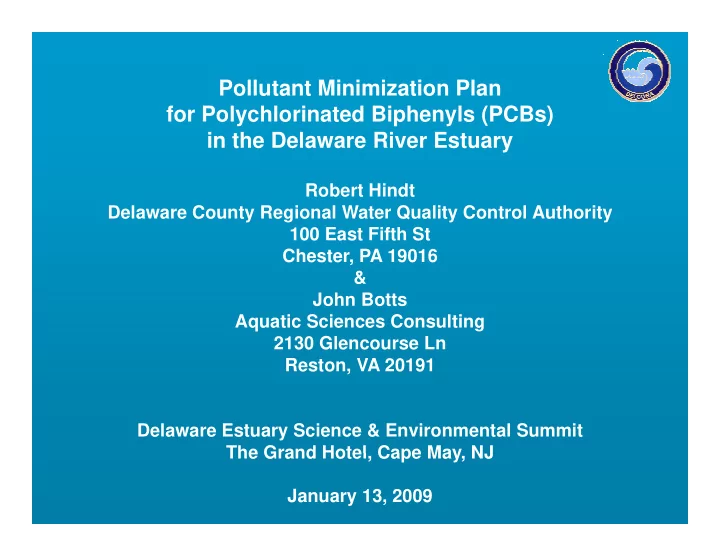

Pollutant Minimization Plan for Polychlorinated Biphenyls (PCBs) in the Delaware River Estuary Robert Hindt Delaware County Regional Water Quality Control Authority 100 East Fifth St Chester, PA 19016 & John Botts Aquatic Sciences Consulting 2130 Glencourse Ln Reston, VA 20191 Delaware Estuary Science & Environmental Summit The Grand Hotel Cape May NJ The Grand Hotel, Cape May, NJ January 13, 2009
Delaware River Basin Fish tissue concentrations of polychlorinated biphenyls (PCBs) often exceed human h health criteria [i.e., federal lth it i [i f d l criteria of 0.17 ng/L and Delaware River Basin Commission (DRBC) criteria ( ) of 0.0079 – 0.064 ng/L as total PCBs (later revised to 0.016 ng/L for all zones)] DRBC set total maximum daily loads (TMDLs) for PCBs for zones 1 – 6 TMDLs allocated to point and non-point discharges
Existing Loadings Versus Stage 1 TMDLs Delaware Estuary Taken from DRBC’s TMDL Report – September 2003
Pollutant Minimization Plan PCBs have been banned since the late 1970s and municipal pretreatment ordinances prohibit PCB discharge to sewer pretreatment ordinances prohibit PCB discharge to sewer systems. Residual PCBs are contributed from unknown and diffuse sources (e g sources (e.g., atmosphere, recycling); however, treatment to atmosphere recycling); however treatment to criteria levels is impractical DRBC chose a pollution prevention approach: Section 4 30 9 of the 2005 Water Quality Regulation Section 4.30.9 of the 2005 Water Quality Regulation Amendments require dischargers to prepare and implement Pollutant Minimization Plans (PMP) to identify and control PCB sources in their service areas/facilities Goal is to achieve a 50 percent reduction of the aggregate point and nonpoint loads of total PCBs within the next five years y
PCB Sources Known Sources (i.e., contribute PCB levels in excess of the ( water quality criteria and have defined pathway of release); Examples: atmospheric deposition, CSO tide gate infiltration, intake water, water supply Potential Sources (i.e., PCBs present, but no pathway of release); Examples: non-leaking electrical equipment such as E l l ki l t i l i t h transformers, current and former waste sites, commercial and household materials Unknown Sources - to be identified through “trackdown”
Pollution Prevention Efforts for Known and Potential Sources for Known and Potential Sources Education Programs g Presentations at public meetings (EAC, LEPC) Handout PCB Brochure to interested groups Education of DELCORA personnel Industrial User Awareness Requested data on PCBs removed and stored at permitted Industrial Users; Documented survey results in data base Industrial Users; Documented survey results in data base Inspections now include review of site for potential PCB containing equipment and issues Assess Waste and Abandoned Sites Assess Waste and Abandoned Sites Visited several sites within our sewer system Reviewing DelTriP reports and coordinating site visits with agencies
PCB Reduction Since 1990s (Documented by Internal Review and (Documented by Internal Review and Industrial User Survey) Project PCB Fluids Removed DELCORA Transformers DELCORA - Transformers 2960 Kg 2960 K and Capacitors Other Facility Projects Other Facility Projects 2025 lbs / 920 Kg 2025 lbs / 920 Kg Other Industrial Users Other Industrial Users 80,000+ Kg 80,000 Kg Total Over 83,000 Kg
Pollution Prevention Efforts for Known and Potential Sources for Known and Potential Sources (continued) Upgrade CSO and Stormwater Infrastructure Rebuilt 24 storm inlets in 2006 and 30 in 2007 Rebuilt 3 CSO Regulator Chambers Installed remote monitoring systems at all CSOs Clean and Rehabilitate Sewers Cleaned sediment from over 225,000 ft of sewer in 2006 and 380 000 ft in 2007 380,000 ft in 2007 Cleaned 300 ft of on-site storm sewer Replaced 160 ft of collapsed brick sewer and 3700 ft of pipe
Ph Phase 1 Trackdown: Total PCBs by Sampling Location 1 T kd T t l PCB b S li L ti Central Delaware County Authority Authority ND 69 Central Delaware PS WRTP Service Area Industry B ND 95 ND 2 Legend g Chester PS Pump Station 1 Water (ng/L) 2 PISCES (ng/L)* EPS-1 PS 33 255 255 I d Industrial User/WRTP Influent t i l U /WRTP I fl t 23** 23 Water (ng/L) WRTP Influent ND 7 7 PISCES (ng/L)* ND 27 19 ND – not detected by HRGC/LRMS Naamans Creek PS NM = not measurable due to matrix NM NM Marcus Hook PS Marcus Hook PS interferences interferences * PISCES – passive in-situ Industry A continuous extraction sampler ** 2006 sample
Phase 2 Trackdown – EPS-1 Sewershed Sampling Locations 95 Legend Stony Creek Interceptor 95 Booth St Interceptor West End Interceptor Delaware Ave Interceptor Trainer Sewer Line DE Sampling Location 95 291 Highway BN BE BE WEN SI WEW WES 291 WE WE BSW 291 T DE DEM 322 DES EPS C WRTP INF
Phase 2 Trackdown – EPS-1 Sewershed Results CDE CDE 16 Actual location (further east) 291 WE BSW 18 10 10 T 17 Legend DE DEM Stony Creek Interceptor 37 18 Booth St Interceptor EPS EPS West End Interceptor West End Interceptor 67 Delaware Ave Interceptor C Trainer Sewer Line <1 CDE Sampling Location INF and Total PCB Result (ng/L) 16 WRTP WRTP 23 23
Question & Answer
Recommend
More recommend